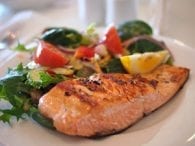1. The colder the water, the more nutritious and safer the fish. Coldwater fish, such as salmon and tuna, contain more of the omega 3 fatty acids, DHA and EPA than do fish from warmer waters, such as catfish, red snapper, trout, and pike. As a general guide, the warmer the water, the lower the oil content of the fish. Ocean fish tend to be safer than lake fish, which are more likely to contain traces of environmental pollutants.
NUTRIMYTH: Shellfish are High in Cholesterol
2. Fish is good heart food. Some fish are high in heart-friendly cholesterol-lowering fish oils. Omega-3 fatty acids, especially DHA, have been linked to reducing total blood fats, reducing LDL (bad) cholesterol, and raising HDL (good) cholesterol. Fish oils rich in DHA are good for the heart. They keep the platelets, the saturated fatty acids, and cholesterol from sticking together and clogging arteries, contributing to heart attacks and stroke. After all, fish fats are called oils, meaning they flow rather than sit. One study showed that one serving of salmon per week cut the risk of heart attack in half. In another study, researchers who followed more then 20,000 male physicians between 40 and 84 years of age for eleven years found that those who ate fish once a week were 52 percent less likely to die of a fatal cardiac arrhythmia (irregular heart beats) than those who consumed fish less than once a month. The heart-friendly effects of fish oil seems to be related to their ability to lower total cholesterol, raise HDL (good cholesterol), and lower LDL (bad cholesterol).
Since fish fat actually seems to be good for people, might this cast some doubt on the conventional nutritional wisdom that a high fat diet contributes to heart disease? It would probably be more accurate to say that right fats contribute to heart health, wrong fats contribute to heart disease. As evidence look at the Eskimos, who have a diet very high in fat, yet have lower levels of cardiovascular disease. Is this because they eat a lot of fish? (It may also be true that Eskimos have a genetically different way of metabolizing extra fats that protects their heart.) It is also true that most people who eat fish regularly have healthier lifestyles and diet in general.
NUTRITIP: A Fish a Day Keeps the Heart Doctor Away
3. Fish is good brain food. Not only is fish good for the heart, it's good for the head. Fish oils are healthy because they contain the two essential omega 3 fatty acids: DHA, which are particularly valuable as nutrients for the cells of the brain and nervous system, the eyes, and the adrenal and sex glands. Come to think of it, those are the organs that helps us think, see, and enjoy sex. Fish food = good brain and heart food.
Fish Food = good brain and heart food.

